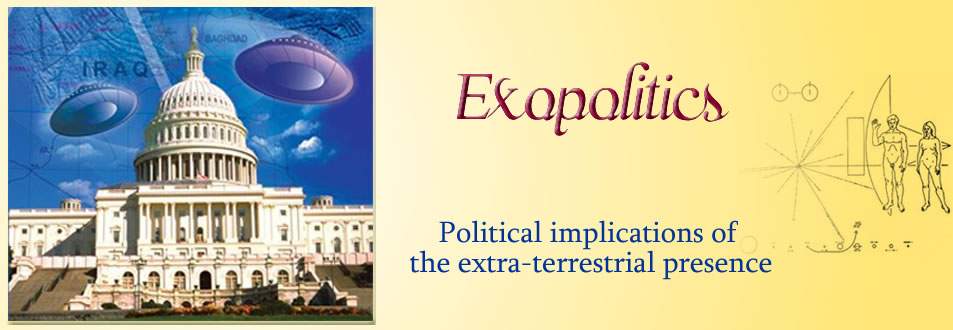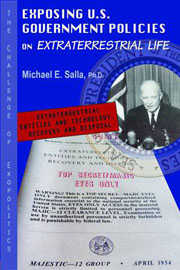Misperceptions and fables about Exopolitics
There has recently been a number of misperceptions and fables circulated about leading figures in exopolitics, and of the exopolitics movement in general. These misperceptions stem from a diverse number of criticisms over claims that intelligent life was recently proven to exist on Mars; lack of support for the Billy Meier case; or for supporting the claims of Alex Collier. In response to these criticisms, I need to first point out that exopolitics is a distinct disciplinary approach that rises beyond belief in the authenticity of any single case, whether it be whistleblower, contactee, UFO sighting event, document, NASA imagery, psychic source, or researcher for that matter. Exopolitics is simply the study of the political actors, processes and institutions concerning extraterrestrial life. That definition of exopolitics does not presuppose the existence of extraterrestrial life, only the possibility of extraterrestrial life. Those interested in exopolitical analysis consider ALL evidentiary sources pertinent to extraterrestrial life whether as a theoretical possibility; credible evidence; or concrete facts covered up by various government and corporate entities. While cooperation in the exopolitics field is highly desirable, unanimity is neither necessary nor healthy. What follows is my personal reaction to some of the criticisms that have emerged, and the misperceptions and fables upon which they are based.
As a pioneer in the rapidly growing exopolitics field, I have set out from the beginning to establish a firm methodological basis for exopolitics research. This I did with my very first paper, "The Need for Exopolitics," where I categorized different evidentiary sources in terms of their persuasiveness, and the different perspectives they provide on extraterrestrial life and technology. I provided an analysis of the evidence, much of it testimonial, in terms of its impact on global politics. This was done from the perspective of a university educator where students of global politics need to consider the content of different sources rather than focus on filtering them out. During the early 20th century, for example, many objected to including Marxist sources into university curricula based on empirical, logical or political objections. Most universities disagreed not because they agreed with all the Marxist sources, but as educators their primary responsibility was to train a new generation of students to intellectually engage with the content of the Marxist literature.
I use a similar pedagogical approach with regard to the exopolitical material. The word ‘pedagogy’ simply means teaching style and the best teachers are those that consider all sources of information relevant to their field – period! Sadly, many UFO researchers fulfill the function of intellectual gatekeepers for a distinct methodological approach based on empirical verification. They unjustifiably claim to be champions of the scientific method and vigorously attack those using sources they consider unproven or fall into a proverbial ‘grey box”. Unfortunately, their methodological approach has more to do with the Catholic Inquisition than any modern scientific approach to the data in question. More to the point, many critics lack any kind of formal academic training in social science research based on qualitative methods where subjective human cognitive processes are exhaustively analyzed. The result of the filtering process may lead to a highly restricted set of data that answers the question whether UFOs are real interplanetary vehicles, but leaves precious little for public policy analysis of evidence pointing to many related political processes, e.g., systematic cover-up of extraterrestrial life, targeting extraterrestrial vehicles with advanced space weapons, joint government-extraterrestrial bases, etc.
In my own research, I recognized that empirical verification of sources was often elusive at best, but more often compromised by various government agencies and corporations directly involved in a cover up of extraterrestrial evidence. According to an early exopolitics pioneer, Major Donald Keyhoe, these entities make up the “Silence Group”. Consequently, the absence of empirical or documentary verification is not a suitable basis for dismissing evidentiary sources but simply an additional factor to be considered in one’s exopolitical analysis. That invites the use of qualitative social science methods rather than a myopic focus on empirical validation of evidence that can always be distorted, removed or faked just as easily as witness testimony. Indeed, psychological warfare specializes in distorting facts and evidence. Many government/military entities have become very proficient in misleading the public about UFOs/extraterrestrials through planted stories, evidence and agents provocateurs.
I wish to now to specifically respond to several criticisms recently raised against exopolitics researchers including myself. The first concerns criticisms of leading exponents of the exopolitics movement for supporting the contention that there is life on Mars based on NASA image analysis. There is solid evidentiary support for the existence of ancient life and primitive life forms based on recent Mars image analysis and satellite studies of the Martian atmosphere. Prior to modern images gained by NASA since the early 1960s, astronomers found much evidence through powerful telescopes of the day that there were artificial constructions on Mars that pointed to ancient intelligent life. More recently, the NASA image analyses by Richard Hoagland, Mike Bara, Dr Thomas Van Flandern and others, have supported the existence of either ancient intelligent life, and/or modern vegetative life. Recently, Andrew D. Basagio released a paper arguing that Mars Rover imagery conclusively prove the existence of modern intelligent life on Mars.
I wish to publicly point out that I do not agree with Basagio’s
conclusions nor his research method. In a phone conference with
Mr Basagio earlier this year, I recommended that he seek independent
expert analysis of the Rover images he analyzed in his paper before
promoting his conclusions. I also pointed out the error in his reasoning
that he had discovered life on Mars since it ignored the research findings
of others such as Hoagland, Van Flandern, etc. I pointed out that the
research findings of at least three independent experts would be the
only way I could support his research paper since I am not an image
analysis expert. He disagreed with my recommendation, and so I have
to publicly part company with Basagio's research since many are mistakenly
associating me as a supporter of his conclusions.
On the merits of Basagio’s paper and conclusions, there is disagreement
among exopolitics researchers. That is not to be unexpected since exopolitics
like any research field has different personalities and methodological
approaches. While we may not always agree, we cooperate as far as possible.
As I said above, unanimity is neither necessary nor healthy for the
growth of the exopolitics discipline and movement. While I agree with
evidence of ancient artificial structures and some form of current
life on Mars, I do not base this on the research of Andrew Basagio.
With regard to the Billy Meier case, I agree with the conclusions of the first investigations conducted by Lt Col Wendelle Stevens (USAF, ret.), Gary Kinder and Lee Elders that there is much merit in Billy Meier’s claims of contact with extraterrestrial life. I disagree however with those who have developed a cult-like environment around Billy Meier as the only alleged extraterrestrial contactee worth investigating. I especially disagree with the claims that Meier is the reincarnation of religious prophets such as Henoch/Enoch, Isaiah, Jmmanuel/Jesus, Muhammed, etc.. and that his warnings of future global catastrophe through a Third World War have any special merit. Unfortunately, the cult-like environment around Billy Meier has been encouraged due to the tight control over him by a Swiss support group called FIGU who restrict his access to modern researchers. Of greater concern is FIGU’s appointment of ‘publicists’ whose sole credentials appear to be unquestioned loyalty to Meier as the only “genuine contactee” and prophet of the modern age.
I now turn to criticisms of Alex Collier whose case I have actively investigated for several years. I have found no evidence of fraud in him claiming to have had extraterrestrial contact, nor has any evidence of fraud ever been presented to me by any critic making such a claim. Despite attempts by Billy Meier’s American publicist, Michael Horn, to persuade an impartial expert, veteran UFO researcher Lt Col Wendelle Stevens otherwise, Col Stevens confirmed in an email to me that he has “no reason to disbelieve him [Collier] or his statements.” Consequently, Horn’s claim of having proved Alex Collier to be a fraud is false. This is part of a pattern of willful deception where Horn admitted in a private email to independent investigators of the Meier material, to be “intentionally posting false and misleading articles on his website”. Overall, I have found Alex Collier to be a very warm sincere individual with much personal integrity who has made great personal sacrifices to talk about his extraterrestrial contact experiences. The recent savage personal attacks on his character and integrity have more to do with the personal deficiencies and “questionable agenda” of Meier's American publicist, than Alex’s character. For those interested in my own views or further information about Alex Collier, please go here.
In conclusion, criticisms of exopolitics pioneers and research fail
to distinguish the extraordinary range in their research findings. Like
any movement, we have a diversity of skills, backgrounds, and conclusions,
but promote cooperation as far as possible. I and my colleagues in the
Exopolitics Institute
draw upon decades of professional experience and research into the extraterrestrial
phenomenon and cognate fields. This research is often shared free to
the general public despite the personal and professional cost for those
of us involved in conducting such research. The same cannot be said
for armchair critics who actively spread many misperceptions and fables
about the exopolitics movement. I thank all the supporters and readers
of my exopolitics research, and look forward to your continued support
of the exopolitics movement.
Michael
E. Salla, Ph.D
Kona, Hawaii
5/13/09
www.Exopolitics.Org
Honolulu
Exopolitics Examiner
***
Forward as you wish. Permission is granted to circulate among private individuals and groups, post on all Internet sites and publish in full in all not-for-profit publications. Contact author for all other rights, which are reserved.



